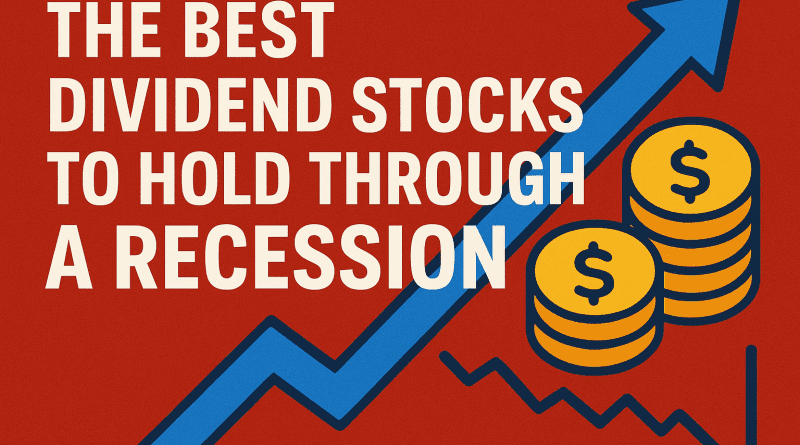The Best Dividend Stocks to Hold Through a Recession
When the economy slows and markets turn volatile, investors often flock to one thing , stability. And few investments provide as much stability during uncertain times as dividend-paying stocks. Recessions can shake even the strongest portfolios, but owning the right dividend stocks can help you weather the storm while still generating consistent income.
In this article, we’ll explore why dividend stocks perform well in recessions, what to look for in recession-proof companies, and which dividend stocks are considered the best to hold when the economy turns south.
Why Dividend Stocks Shine During a Recession
When the market declines, many growth stocks see their valuations plummet because their future earnings are less certain. Dividend stocks, on the other hand, tend to belong to companies with steady cash flows, proven business models, and a commitment to rewarding shareholders.
These companies, often in industries like utilities, consumer staples, healthcare, and telecommunications—have products or services that remain in demand regardless of economic conditions. Whether consumers are tightening their belts or not, people still need electricity, food, medicine, and internet access.
Moreover, dividend payments provide tangible returns even when stock prices stagnate. Reinvested dividends can also compound over time, helping investors recover faster once the market stabilizes.
What to Look for in Recession-Proof Dividend Stocks
Not all dividend stocks are created equal. During a downturn, it’s crucial to focus on quality and sustainability rather than yield alone. Here are a few key metrics to evaluate:
- Dividend History and Consistency
Look for companies with a long track record of paying, and increasing dividends. These are often referred to as Dividend Aristocrats (companies that have raised dividends for 25+ consecutive years). - Payout Ratio
A healthy payout ratio (typically 40–60%) indicates that a company isn’t overextending itself to pay dividends. Companies with low payout ratios are more likely to maintain their dividends during recessions. - Strong Cash Flow and Low Debt
Recession-proof dividend payers usually generate steady free cash flow and maintain manageable debt levels. These factors ensure the company can cover dividends even when profits dip. - Defensive Sectors
Focus on industries with inelastic demand, utilities, consumer staples, healthcare, and telecom are often the safest bets.
Top Dividend Stocks to Hold Through a Recession
Here are some examples of dividend stocks that have historically proven resilient during economic downturns. (Note: This list is for informational purposes only and not financial advice.)
1. Procter & Gamble (PG)
As a leading consumer staples company, Procter & Gamble sells everyday essentials—shampoo, detergent, toothpaste, and more. Demand for these products remains steady even during recessions. P&G has increased its dividend for over 65 consecutive years, making it one of the most reliable income stocks on the market.
2. Johnson & Johnson (JNJ)
A healthcare giant with a diverse business model spanning pharmaceuticals, medical devices, and consumer health products, Johnson & Johnson has raised dividends for more than 60 years. Healthcare spending tends to be stable during recessions, helping JNJ maintain steady earnings.
3. Coca-Cola (KO)
Coca-Cola is another Dividend Aristocrat that thrives on brand strength and global reach. With consistent cash flow and a 60-year history of dividend growth, KO remains a cornerstone for income-focused investors seeking stability.
4. Verizon Communications (VZ)
Telecommunications are essential in both good and bad times. Verizon’s massive subscriber base and reliable revenue streams make it a solid defensive pick. The stock offers a high dividend yield and consistent payouts, appealing to long-term investors.
5. Duke Energy (DUK)
Utilities are among the most recession-resistant sectors, and Duke Energy is one of the largest power providers in the U.S. The company’s predictable cash flow supports a healthy dividend yield, making it ideal for those seeking income stability during turbulent markets.
6. PepsiCo (PEP)
PepsiCo combines the resilience of consumer staples with strong brand recognition. The company’s diverse portfolio, ranging from beverages to snacks—helps it remain profitable even when consumers cut back elsewhere. PEP has raised its dividend for over 50 years.
Tips for Building a Recession-Resistant Dividend Portfolio
- Diversify Across Sectors
Even the best dividend stocks can face headwinds. Balance your holdings across multiple recession-resistant industries. - Reinvest Dividends
Automatically reinvesting dividends can accelerate long-term growth and offset temporary price declines. - Focus on Quality Over Yield
High-yield stocks can be tempting, but if the yield is unsustainably high, it might signal financial trouble. Stick with companies that can maintain dividends over decades, not just quarters. - Stay Patient
Recessions create uncertainty, but high-quality dividend stocks often rebound faster than the broader market once recovery begins.
Final Thoughts
Recessions are inevitable, but financial setbacks don’t have to derail your investment goals. By holding strong, dividend-paying companies, you can generate consistent income, protect your capital, and even find opportunities amid the chaos.
Whether you’re a seasoned investor or just getting started, dividend stocks like Procter & Gamble, Johnson & Johnson, and Coca-Cola have proven that stability and reliability never go out of style. In uncertain times, they’re not just stocks, they’re peace of mind.
